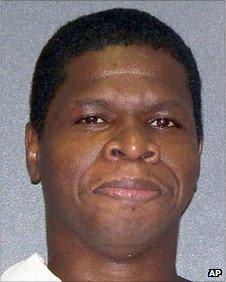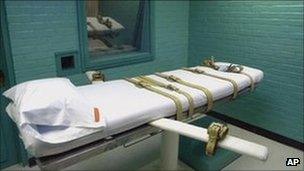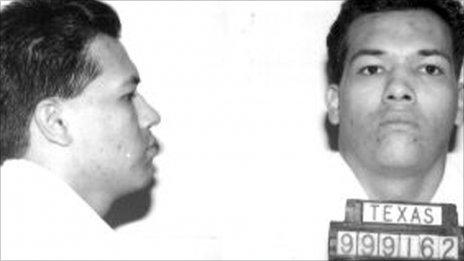Duane Buck spared execution by US Supreme Court
- Published

Buck told officials he felt "good" after hearing the decision
The US Supreme Court has granted a last-minute stay of execution to a double killer whose lawyers argue the case was tainted by race issues.
Duane Buck, 48, shot and killed his ex-girlfriend Debra Gardner and Kenneth Butler at her home in Texas in 1995.
His legal team said a psychologist who testified that black men were more likely to pose a future public threat could have influenced the sentencing.
Buck had been scheduled to face a lethal injection on Thursday evening.
His guilt is not being questioned, but his lawyers appealed on the basis that a new sentencing hearing was necessary because the jury was unfairly influenced.
Buck praised God upon hearing of the stay of execution, according to Texas Department of Justice spokesman Jason Clark.
"Praise the Lord, God is worthy to be praised. God's mercy triumphs over judgment. I feel good," he told Mr Clark.
New execution date?
Mr Clark said Buck had been praying in his cell in Huntsville, Texas, when he arrived to tell him the news.
Hours earlier, Buck ate what he thought would be his last meal of fried chicken, salad, french fries, fried fish, hot sauce, jalapeno peppers, apples, iced tea and water.
Buck's lawyers also appealed to Texas Governor Rick Perry, external, who is the current frontrunner in the race for the Republican presidential nomination.
The Supreme Court's decision means Gov Perry is no longer required to take action.
The decision came two hours into a six-hour window in which Buck could have been executed. Texas officials had refused to act until the Supreme Court had made its decision.
The Supreme Court received two appeals for the case. They denied one, external and granted the other, external.
In a decision with no other details, the court said it was stopping the execution so it could continue to consider the request.
If the justices decide against the request, Buck would become eligible for a new execution date.
"No-one should be put to death based on the colour of his or her skin," Kate Black, one of Buck's attorneys said after the decision.
"We are confident that the court will agree that our client is entitled to a fair sentencing hearing that is untainted by considerations of his race."
Buck's lawyers say that during their client's sentencing, a psychologist was asked leading questions by prosecutors in court. Dr Walter Quijano testified that black men were more likely than others to commit acts of violence.
Children witnessed murders
The case is one of six that the Texas attorney general reviewed in 2000, and said needed to be reopened because of racially charged statements made during the trial.

More people have been executed under Rick Perry than any other Texas governor in modern US history
In July 1995, a week after breaking up with 32-year-old Ms Gardner, Buck shot her and Mr Butler at her home outside Houston.
Under the influence of drugs, he accused Mr Butler, 33, of sleeping with Ms Gardner.
Buck used a shotgun to kill Mr Butler inside the house, then chased Ms Gardner outside and shot her in the street.
A third person, Phyllis Taylor, was also shot, but survived. Ms Gardner's 14-year-old daughter and 11-year-old son witnessed the murders.
Officers said Buck was laughing at the time of his arrest, saying Ms Gardner deserved her fate.
The Texas Board of Pardons and Paroles - all appointed by Gov Perry - denied Buck's request for clemency on Wednesday. The 5th US Circuit Court of Appeals also rejected his appeal.
Gov Perry is a staunch advocate of capital punishment - a view he aired in his first nationally televised presidential debate last week.
During Gov Perry's 11 years in office, 235 convicted killers have been executed in Texas, more than under any other governor in modern US history.
- Published20 August 2014

- Published8 July 2011
